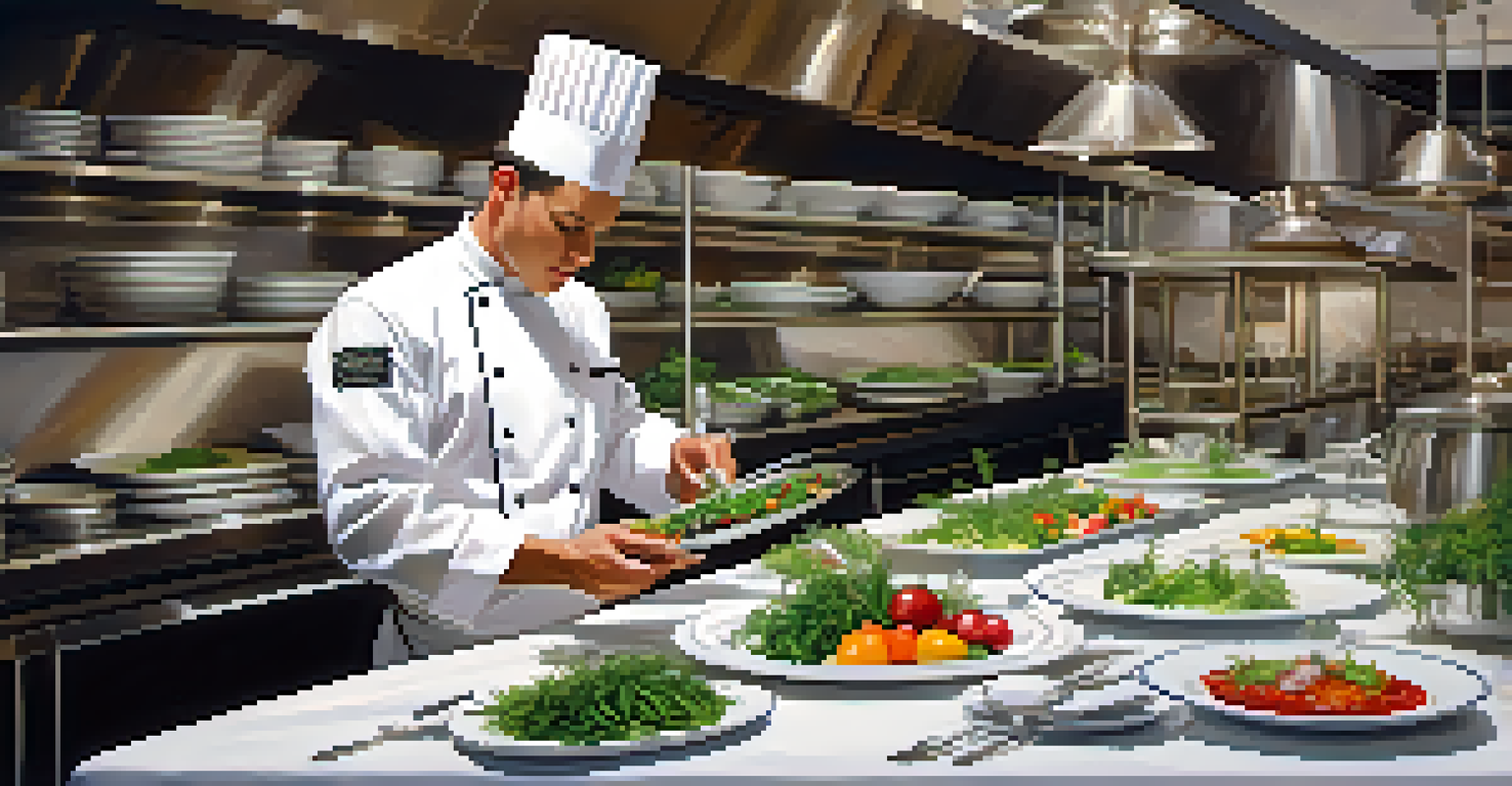From Lobster Rolls to Modern Cuisine: Boston's Impact

The Rich History of Boston's Culinary Scene
Boston's culinary journey is steeped in history, reflecting its coastal roots and the diverse cultures that have influenced it. From the early days of Native American cooking to the arrival of European settlers, the city's food landscape has evolved remarkably. Iconic dishes like clam chowder and lobster rolls emerged as staples, showcasing the freshest seafood available.
Food is our common ground, a universal experience.
Each wave of immigration brought new flavors to Boston, enriching its culinary palette. Italian, Irish, and Asian communities introduced ingredients and cooking methods that transformed local dining. This melting pot of cultures has made Boston a vibrant food destination where traditional recipes meet modern innovation.
Today, Boston’s cuisine is a blend of the old and the new, where classic dishes coexist with contemporary culinary trends. This evolution not only celebrates its historical roots but also embraces the future, making Boston a city that continuously adapts and thrives on its culinary heritage.
The Lobster Roll: A Bostonian Staple
No discussion of Boston's food scene would be complete without mentioning the lobster roll. This iconic dish, consisting of fresh lobster meat in a buttery roll, perfectly encapsulates the city’s seafood tradition. Its simplicity is deceptive; the best lobster rolls are a testament to quality ingredients and expert preparation.

Originally, lobster was considered a food for the less fortunate, but it has since transformed into a luxurious treat. The lobster roll's rise to fame mirrors the changing perceptions of seafood in America, evolving from humble beginnings to a gourmet favorite. Today, you can find lobster rolls in various styles, each restaurant adding its own twist.
Boston's Culinary Evolution
Boston's food scene has transformed from traditional Native American and European influences to a vibrant mix of international cuisines and modern culinary trends.
From food trucks to high-end restaurants, the lobster roll has become a symbol of Boston’s culinary identity. This beloved dish not only attracts locals but also visitors eager to experience an authentic taste of New England, solidifying its place in the city's rich culinary narrative.
Farm-to-Table Movement in Boston
In recent years, Boston has embraced the farm-to-table movement, emphasizing fresh, locally sourced ingredients. This trend reflects a growing awareness of sustainability and health, as chefs seek to create dishes that celebrate the region’s agricultural bounty. Restaurants are now forming partnerships with local farms, ensuring that seasonal produce takes center stage on their menus.
The best way to find yourself is to lose yourself in the service of others.
This movement has also encouraged a return to traditional cooking methods, where the focus is on enhancing the natural flavors of ingredients. Chefs are experimenting with new ways to prepare familiar foods, often resulting in innovative dishes that surprise and delight diners. For example, a simple vegetable can be transformed into a gourmet dish with the right technique and presentation.
Moreover, the farm-to-table ethos has sparked a community connection, as diners become more interested in where their food comes from. This transparency fosters a sense of trust between consumers and chefs, creating a dining experience that is not only delicious but also meaningful.
Craft Beer and Boston's Brewing Legacy
Boston's brewing history dates back centuries, with the city being home to some of America’s oldest breweries. The craft beer movement has reinvigorated this legacy, with local breweries popping up around the city, each offering unique flavors and styles. This renaissance has turned Boston into a hub for beer enthusiasts, who flock to sample innovative brews.
Craft breweries often collaborate with local restaurants to create beer pairings that enhance the dining experience. This synergy allows chefs to craft dishes that complement the rich flavors of local brews, further elevating Boston's culinary landscape. The result is a vibrant beer culture that celebrates creativity and community.
Lobster Roll as a Local Icon
The lobster roll, once a humble dish, has become a beloved symbol of Boston's seafood tradition, showcasing the city's rich culinary identity.
Events like beer festivals and brewery tours have become popular, allowing locals and tourists alike to engage with Boston's brewing heritage. This connection to the past, combined with a forward-thinking approach, ensures that Boston's beer scene remains dynamic and influential in the culinary world.
The Rise of International Cuisine
Boston's food scene has also seen a significant rise in international cuisine, reflecting its diverse population. Neighborhoods like Chinatown and the North End are culinary hotspots, offering authentic dishes that transport diners around the world. From dim sum to hand-rolled pasta, Boston's restaurants showcase the rich tapestry of global flavors.
This culinary diversity encourages experimentation, as chefs blend traditional recipes with local ingredients. For instance, you might find a Mexican taco truck using fresh New England seafood, creating a delightful fusion that surprises the palate. This willingness to innovate keeps the dining experience fresh and exciting.
Moreover, international cuisine has made Boston a destination for food lovers seeking unique culinary experiences. Food festivals celebrating various cultures further highlight this diversity, inviting everyone to explore and appreciate the flavors that different communities bring to the table.
Boston's Influence on Modern Culinary Trends
As a major culinary hub, Boston has played a pivotal role in shaping modern culinary trends. The city's restaurants are often at the forefront of innovative dining, introducing new concepts that ripple across the nation. From pop-up restaurants to food halls, Boston continues to redefine the way people experience food.
Chefs in Boston are not only focused on taste but also on the overall dining experience. They are increasingly incorporating elements like interactive dining, where guests can participate in the cooking process or enjoy dishes tailored to their preferences. This engagement transforms a meal into an event, creating lasting memories.
Rise of Farm-to-Table Dining
The farm-to-table movement in Boston emphasizes fresh, locally sourced ingredients, fostering community connections between chefs and diners.
Furthermore, Boston’s commitment to sustainability influences culinary trends nationwide. The emphasis on local sourcing and reducing food waste is becoming a standard practice in restaurants across the country, reflecting a growing awareness of environmental responsibility. Boston’s forward-thinking approach sets a benchmark for others to follow.
Conclusion: Boston's Culinary Future
Looking ahead, Boston's culinary scene is poised for continued growth and innovation. The city's rich history, combined with its embrace of new trends, creates a dynamic environment for chefs and diners alike. As Boston celebrates its culinary heritage, it also opens doors to new ideas and flavors that will shape the future of dining.
The fusion of traditional and modern cuisine will likely remain a hallmark of Boston's food identity. As chefs experiment with ingredients and techniques, the city's restaurants will continue to surprise and delight guests, keeping the dining experience fresh and engaging. This ongoing evolution promises exciting possibilities for food lovers.

Ultimately, Boston’s impact on modern cuisine is a testament to its resilience and creativity. The city’s culinary narrative is one of adaptation and innovation, ensuring that it remains a beloved destination for food enthusiasts while honoring the traditions that laid the groundwork for its vibrant food culture.